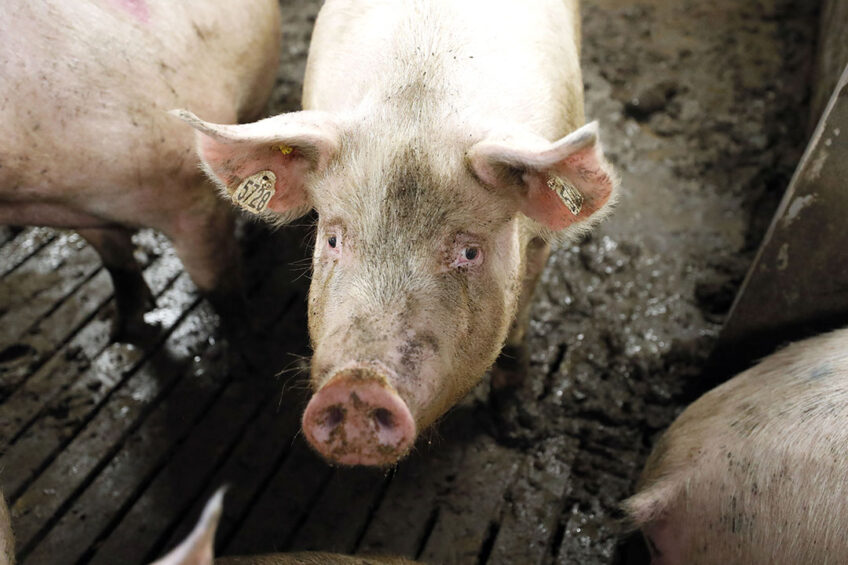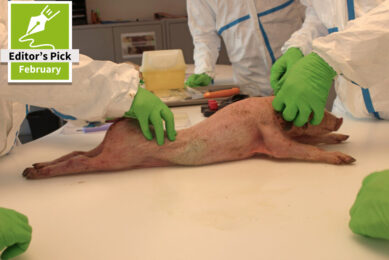Evaluating pig gut health from an amino acid perspective

Understanding the impact of amino acids on gut health assists in developing nutritional plans to improve pig health, welfare, production performance and profitability.
A healthy gut is one of the pillars of improved pig health, welfare, production performance, and profitability. Gut health affects nutrient digestion and absorption, mucins and immunoglobulins secretion, energy generation, and the overall health status of pigs. The anatomical structure of the gut, and gut microbial community also known as the gut microbiota play essential roles in gut health and functions through the metabolism of dietary components. Amino acids are one of the major nutrients required for maintaining the gut mucosal mass and integrity and supporting the growth of gut microbiota. This article will discuss the impact of dietary amino acids on pigs’ gut health and functioning.
How does gut microbiota affect gut health?
Normal anatomical structure and appropriate luminal microbiota are essential components for gut health. Piglets are born with a sterile gut, but later in life the gut is colonised by numerous microorganisms from their feed and their environment such as lactic acid bacteria, enterobacteria, streptococci, approximately 400 to 640 species of obligate anaerobes, yeasts, protozoa, and viruses.
The gut microbiota, which has a symbiotic relationship with the host, contributes to the development of gut functions through the metabolism of dietary components such as amino acids and interaction with gut epithelial cells. In addition, the gut microbiota recovers energy from indigestible carbohydrates and protects the host from pathogens by forming a front line of mucosal defense.
Amino acids’ contribution
The content and types of dietary amino acids affect gut health and functioning. Changes in dietary amino acids’ quantity and quality manipulate the gut structure as well as the diversity and functions of the gut microbiota. Fermentation of excessive amounts of dietary amino acids in the lower gut results in the production of various toxic products that are associated with potential pathogenic bacteria growth and a decrease in faecal counts of beneficial bacteria such as Bifidobacterium. Amino acid metabolites such as butyrate and indole have positive effects on gut physiology; however, other metabolites such as ammonia, hydrogen sulphide, and nitrite have detrimental effects on the epithelia and gut mucosa. On the other hand, the gut microbiota recycles amino acid metabolites to synthesise essential microbial proteins.
Gut morphology maintenance function
Dietary amino acids such as glutamic acid and glutamine provide oxidative fuels for rapidly dividing gut cells and mucosa, thus enhancing gut epithelial cells’ turnover rate in young pigs. Dietary glutamine supplementation has positive effects on gut development via increasing villus height and villus-to-crypt ratio and reducing crypt depth. Dietary arginine supplementation reduces gut tissue damage, promotes gut mucosa healing, and reverses gut dysfunction. In nursery pigs, adding amino acids containing sulphur such as methionine to drinking water improves gut morphology maintenance by increasing villous height, reducing oxidative stress, and improving glutathione production in the mucosa cells. Moreover, methionine reduces the bacteria fermentation via improving nutrient digestion and absorption and leaving less substrates for bacteria to use. Cysteine is another amino acid containing sulphur which synthesises mucosal epithelial proteins such as glutathione and mucin in weanling pigs. Threonine, an important component of mucins in the gut, plays a key role in mucin synthesis and barrier integrity maintenance and it is critical for maintaining gut morphology and development as well.
Gut luminal microbiota promotion
Glutamate alters the composition of the gut microbial community and increases the diversity of microbiota by promoting the colonisation of Faecalibacterium prausnitzii and Roseburia. Lysine restriction increases the consistency of gut microbiota, which in turn affects amino acid and carbohydrate metabolism, membrane transport, endocrine system, cellular signaling, replication and repair. Threonine controls protein homeostasis in the body and promotes the growth of beneficial gut bacteria. Supplementing with liquid methionine analogue in drinking water reduces the gut pH and the concentrations of caecum acetic acid, enhances nutrient digestion and absorption through increased villus height, and improves growth performance in nursery pigs.
Gut immune-physiological maintenance function
Arginine is a constituent of protein synthesis and a regulatory molecule limiting gut alterations and maintaining gut immune-physiological functions. In addition, arginine improves the gut barrier system of piglets by reducing trans-epithelial permeability in gut inflammation. Supplementing a mycotoxin-contaminated feed with 1% arginine reduces the gut abnormalities caused by mycotoxins. Threonine supply is essential to maintaining gut immune-physiological functions by contributing to mucin synthesis and maintaining gut barrier integrity. Furthermore, increased intake of true ileal digestible threonine in young pigs augments humoral antibody production and serum specific IgG concentrations. Methionine and cysteine are needed during immune challenges. Methionine is the methyl donor in processes such as DNA methylation and polyamine synthesis, which in turn increase immune cell proliferation. Cysteine is required for taurine production, acting as an antioxidant, as well as a cell membrane stabiliser.
Anti-inflammatory and anti-oxidative roles of amino acids
Arginine alleviates gut inflammation and pathology, enhances epithelial barrier function, and controls mucosal immunohomeostasis. Glycine has anti-inflammatory and cytoprotective functions. Moreover, glycine has a protective effect in mesenteric ischaemia/reperfusion injury through the inhibition of cell death. Methionine and cysteine are endogenous antioxidants and defend cells against oxidative stress. Methionine supplementation in nursery pigs’ diet protects proteins from oxidative damage, enhances the duodenum morphology by reducing oxidative stress, and improves glutathione production in mucosa cells. Glutathione is a major cellular antioxidant that detoxifies gut oxidative stress and injury related to microbe-induced inflammation.
Concluding remarks
Amino acids are beneficial for maintaining pigs’ gut health and functions, especially from the gut morphology maintenance, gut microbiota promotion, gut immune-physiological maintenance, and anti-inflammatory and anti-oxidative perspectives. Both the content and types of dietary amino acids affect gut health and function. In addition, due to the global push to ban the use of antibiotics as growth promoters for pig production, further research is required to investigate the complex mechanisms underlying amino acids’ effects on developing gut morphology and functions of young pigs.
Source: Physiological Effects of Dietary Amino Acids on Gut Health and Functions of Swine, Zhongyue Yang and Shengfa F. Liao. Published in Front Vet Sci. 2019; 6: 169.











